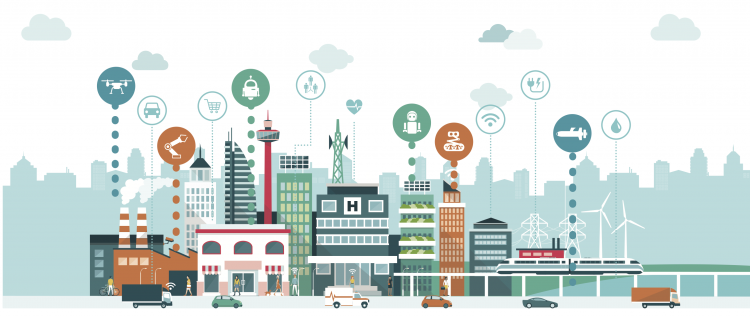Last week — 18th to 21st September 2019 — the first International Competition on Smart Cities and Robotics took place in Milton Keynes (UK). Different teams from Spain, the UK, Germany, France, Portugal and others were crowding the Centre:MK to take part in this competition. As the name suggests, SCiRoC aims at bringing robots in the context of smart cities. Indeed, their primary objective was to interact both with smart cities infrastructures, such as the MK Data Hub, and citizens.
The competition consisted of five different operational contexts — or episodes:
ep 3) deliver coffee shop orders,
ep 4) take the elevator,
ep 7) shopping pick and pack
ep 10) open the door
ep 12) fast delivery of emergency pills
During the first 3 days, the different teams had the opportunity to perform some trials, understand how their robots performed in real-world case scenarios and further improve their software. For each episode, the two teams that performed the best during the trials, were selected to participate to the final of that episode.
Just to give an example of the complexity of the different challenges, here is a glimpse of the final for the episode of delivering coffee orders (episode 3).
I also took part to this competition as Assistant Referee for the “taking the elevator” episode (episode 4). My task consisted of supporting referees and teams in accomplishing the different trials. In particular, I was setting up each new trial on the MK Data Hub, with different configurations, so that the robot could slightly differentiate its task among the different sessions. In addition, I supported the referees in the backstage, observing the interaction between the robot and the users, inside the elevator. Also, since I was already in the backstage, I was also involved in a more technical task: opening/closing the elevator doors. You need to have certain skills for this :P. A funny video follows.
In particular, for the elevator episode, the robot had the objective of going to a specific floor, which value was defined in the trial configuration on the MK Data Hub. To complete this task, the robot would start entering the arena and retrieve its destination from the data centre. Then, it moved towards the elevator following a pre-defined path, which required interacting with citizens. Once reached the elevator it would wait and socialise with other users — some robots were able to make jokes. When doors opened, the robot would move inside and kindly ask the users to push the button of its desired floor. Each time the robot recognised that the doors were opened, it would ask the floor number and if that floor matched its destination, it would move out and leave the arena.
At the beginning, we observed some failures as robots have been always tested in controlled environments, such as laboratories. Being tested on real scenarios posed teams to new challenges. However, as trials went by, robots got more acquainted with the environment and increased their performance.
All episodes were very difficult, however, the different teams managed to amaze the audience with their results.
How long is going to take robots to mingle and be part of our social activities? Let’s wait for SCiRoC 2021 to have a better understanding.
Media
My thread
Set-ups for the #sciroc2019 in progress! Smart Cities Robotics Competition in @centremk
… @isdsou @mkcouncil @kmiou pic.twitter.com/1RvjVuuk91— Angelo A. Salatino (@angelosalatino) September 17, 2019
From SCiRoC account
Official Twitter account — @SciRoc_EU
🎉🎉🎉 Our warmest congratulations to the winners of the #sciroc2019 challenge! 🎉🎉🎉@ETSIT_URJC @LeedsRobotics @thebitbots @TeamBathMarine @ntt_disruption
To download the full-size photos: https://t.co/rpM84Pt4Gq
More pics coming soon on the website, stay tuned! pic.twitter.com/LLuuCO73ku
— SciRoc (@SciRoc_EU) September 23, 2019
From BBC
More info
SCiRoC
Website — https://sciroc.eu/
SciRoc is a EU-H2020 funded project supporting the European Robotics League (ERL), whose aim is to bring ERL tournaments in the context of smart cities.
A key novelty of the SciRoc project is the introduction of robots in smart cities in ERL challenges and, in particular, the ERL Smart Cities, whose aim is to show how robots will integrate in the cities of the future as physical agents living in them. This adds a new challenge to ERL, which will be pursued through the organisation of two Smart CIties RObotics Challenges (The SciRoc Challenges) in 2019 and 2021.
Leveraging the functionalities developed within the other challenges of the European Robotics League (ERL Consumer, ERL Professional and ERL Emergency), robots will be required to cooperate with a simulated smart city infrastructure and interact with its citizens, accomplishing tasks such as assisting customers, providing professional services and supporting during emergency situations.
MK Data Hub
Website — https://datahub.mksmart.org/
The MK Data Hub is award-winning technical, data infrastructure of the MK:Smart project, supporting the collection, integration and use of large amounts of data from many diverse resources relevant to city systems.
The datasets include local and national open data, data streams from both key infrastructure networks (energy, transport, water) and other relevant sensor networks (e.g. weather and pollution data), data crowdsourced from social media and mobile applications, etc. As a data platform for the city, the MK Data Hub enables the onboarding of data from data providers, who remain in control of the redistribution policies (the data licences) and the access permissions they want to apply. The data catalogue supports the discovery of the data, as well as the description and traceability of the relevant metadata, such as the sources and rights that apply to the data.
Post-credits scene
This happens when you have two Spanish teams in the final.



